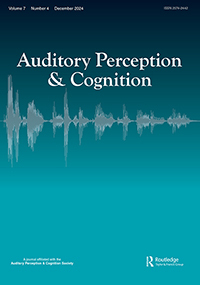Author: Poudrier, Ève, Bell, Bryan, Lee, Jason Yin Hei, and Sapp, Craig Stuart
Publication details: Auditory Perception and Cognition, Volume 7, Issue 4, pp. 291-318
Weblink: doi.org/10.1080/25742442.2024.2396980
Abstract: This study investigates the influence of dissonance on listeners’ ratings of five emotional dimensions (mood, energy, movement, dissonance, and tension) using excerpts from twentieth-century keyboard music that feature complex rhythmic structures. Dissonance was operationalized as randomized pitches from four scale types: pentatonic major, diatonic major, whole-tone, and chromatic. Register presentation of two contrasting rhythmic groups within each excerpt was counterbalanced, while rhythmic structure was held constant, resulting in 64 distinct stimuli (8 excerpts × 4 scales × 2 register conditions), from which rhythm and pitch measures were extracted. There was a main effect of scale type, but not register. Pentatonic excerpts were rated as more positive and less dissonant than diatonic, whole-tone, and chromatic excerpts. Whole-tone and chromatic were also perceived as more negative and dissonant than diatonic, as well as more tense and less entraining than both pentatonic and diatonic. There was no effect of scale on energy. Sonority dissonance was a reliable predictor of perceived dissonance and tension, as well as mood and movement. Furthermore, several rhythmic features were predictive of participants’ perceived emotions, providing support for the use of pitch-randomized naturalistic stimuli to assess the influence of musical structure on perceived emotions.
